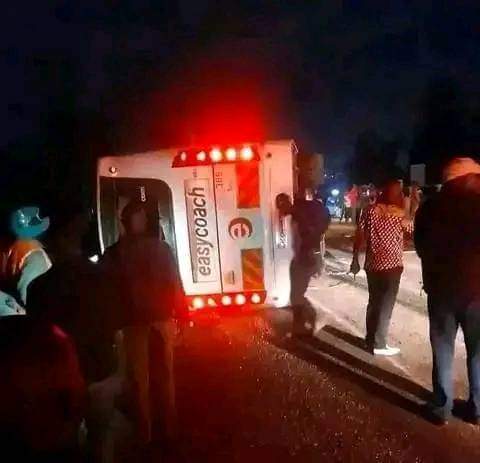KISUMU, Kenya Apr 2 – One student died and several others sustained injuries after an Easy Coach Bus, ferrying Chavakali Boys High School students to Nairobi, was involved in a road accident in KisumuThe students, who had closed for the April holidays, had hired the bus for their journey to Nairobi when the accident occurred at the Coptic area, a notorious black spot along the Kisumu-Kakamega road.


Charles Kisiengo, the base commander of Kondele police station, said it was a self-involving accident. The driver reportedly lost control of the vehicle while negotiating a roundabout before the Mamboleo junctionWe responded well in time and managed to pull out the trapped students, unfortunately, we lost one,” he said.
The injured students were rushed to Jaramogi Oginga Odinga Teaching and Referral Hospital for treatment.Police said 33 students were admitted, with 30 at Jaramogi Oginga Odinga Teaching and Referral Hospital and three at Nightingale Hospital.
According to eyewitness Stephen Wasuna, the bus fell with a loud thud, alarming nearby residents. Locals assisted the police in rescuing the trapped students, who were then transported to the hospital using police vehicles and ambulances.“I was in my house when I heard a loud bang and when we rushed to check we found the bus had overturned,” he said.
The deceased student’s body has been preserved at the hospital morgue for further procedures. Additionally, the authorities have towed the vehicle involved in the accident to Kondele police station for ongoing investigations.
The recent tragic incident involving an Easy Coach bus overturning in Kisumu, resulting in the loss of life and injuries among students from Chavakali Boys School, has brought forth immense sorrow and raised critical questions about road safety and the well-being of passengers, especially students. This essay aims to delve into the circumstances surrounding the accident, the potential causes, implications, and the urgent need for preventative measures.
On 2nd April, an Easy Coach bus carrying students from Chavakali Boys School overturned in Kisumu, resulting in one fatality and multiple injuries. The incident shocked the nation, highlighting the vulnerability of passengers, particularly students, to such tragic accidents.
Road Conditions: Kisumu, like many parts of Kenya, experiences diverse weather conditions that can affect road surfaces. Poorly maintained roads, especially during rainy seasons, increase the risk of accidents, particularly on busy routes like the one the Easy Coach bus was traveling on.
Driver Fatigue or Error: Driver fatigue or error is a common cause of accidents worldwide. Long hours behind the wheel, inadequate rest periods, or distractions while driving can impair a driver’s judgment and reaction time, leading to accidents. Investigating whether the bus driver was fatigued, distracted, or made an error is crucial in understanding the accident’s root cause.
Mechanical Failure: Vehicle malfunctions, such as brake failure or tire blowouts, pose significant risks to road safety. Regular maintenance and inspections are essential to prevent such mechanical failures. An investigation into the bus’s maintenance history and the condition of its components could shed light on whether mechanical failure played a role in the accident.
Speeding: Excessive speed is a leading cause of road accidents globally. Drivers who exceed speed limits put themselves and their passengers at heightened risk of collisions and loss of control. Determining whether the bus was traveling at an unsafe speed at the time of the accident is vital in assessing the role of speeding in the tragedy.
Passenger Safety Measures: The effectiveness of safety measures within the bus, such as seat belts and emergency exits, can significantly impact passengers’ survival rates in accidents. Evaluating whether these safety features were properly utilized and maintained could reveal opportunities for improvement in passenger safety standards.
Implications and Consequences:
The repercussions of the Easy Coach bus accident extend beyond the loss of life and injuries. The incident underscores broader issues related to road safety, transportation regulations, and the welfare of students:
Public Safety Concerns: The tragic accident raises concerns about the safety of public transportation systems and the need for stringent regulations to ensure passenger safety. Addressing deficiencies in road infrastructure, vehicle maintenance, and driver training is imperative to prevent similar accidents in the future.
Educational Disruption: The loss of life and injuries among students disrupts their education and emotional well-being. Schools and authorities must provide adequate support and counseling to affected students, teachers, and families to help them cope with the trauma and loss.
Legal and Regulatory Reforms: The accident prompts a reassessment of existing laws and regulations governing road safety and public transportation. Strengthening enforcement mechanisms, imposing stricter penalties for traffic violations, and implementing comprehensive safety standards can mitigate the risk of accidents and protect passengers’ lives.
Community Response and Solidarity: Tragic incidents like the Easy Coach bus accident evoke strong community responses, including expressions of solidarity, support for the affected families, and calls for action to prevent future tragedies. Civil society organizations, government agencies, and private sector stakeholders must collaborate to implement effective solutions and promote a culture of safety on the roads.
The Easy Coach bus accident in Kisumu serves as a somber reminder of the urgent need to prioritize road safety and passenger well-being. By conducting thorough investigations, implementing targeted interventions, and fostering collaboration among stakeholders, we can work towards preventing similar accidents and ensuring safer transportation systems for all. As we mourn the loss of lives and extend support to those affected, let us commit ourselves to building a future where tragedies like this are minimized, and every journey is a safe one.
Economic Impact: Beyond the human toll, road accidents carry significant economic costs, including medical expenses, property damage, and loss of productivity. The Easy Coach bus accident in Kisumu will likely result in financial burdens for the affected families, as well as the transportation company and insurance providers. Investing in road safety measures and accident prevention can help alleviate these economic burdens in the long term.
Trust in Public Transportation: Incidents like the Easy Coach bus accident can erode public trust in the safety and reliability of public transportation services. Passengers may hesitate to use public buses, fearing for their safety on the roads. Rebuilding trust requires transparent communication, proactive safety measures, and accountability for transportation providers to demonstrate their commitment to passenger well-being.
Political Accountability: Tragic accidents often spark public scrutiny of government agencies responsible for transportation regulation and oversight. Calls for accountability may lead to inquiries, investigations, and potential reforms to strengthen regulatory frameworks and enforcement mechanisms. Political leaders and policymakers must prioritize road safety as a fundamental aspect of public welfare and take decisive action to address systemic challenges.
Long-Term Solutions: While immediate responses such as rescue operations and medical assistance are crucial in the aftermath of accidents, sustainable solutions require long-term planning and investment. Governments, in collaboration with relevant stakeholders, must develop comprehensive road safety strategies that address infrastructure improvements, driver training programs, vehicle standards, and public awareness campaigns. These efforts should be informed by data-driven approaches and international best practices to maximize their effectiveness.
Community Resilience and Support: Tragic events have the potential to unite communities and foster resilience in the face of adversity. The response to the Easy Coach bus accident in Kisumu, including support networks, volunteer efforts, and solidarity marches, demonstrates the strength of community bonds in times of crisis. Harnessing this collective spirit can drive positive change and empower communities to advocate for safer roads and transportation systems.
Lessons Learned: Every accident presents an opportunity to learn and prevent future tragedies. The Easy Coach bus accident in Kisumu serves as a sobering reminder of the complex interplay of factors contributing to road safety risks. By studying the circumstances surrounding the accident, identifying root causes, and implementing targeted interventions, we can honor the memory of the victims and strive towards a future where such incidents are minimized.
In the wake of the Easy Coach bus accident in Kisumu, it is imperative that we confront the systemic challenges facing road safety and transportation infrastructure. By addressing the multifaceted implications of the accident and committing to comprehensive solutions, we can honor the lives lost, support the affected communities, and build a safer, more resilient transportation system for all.
